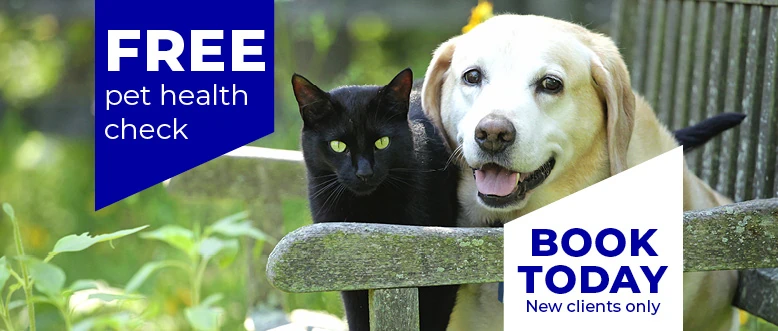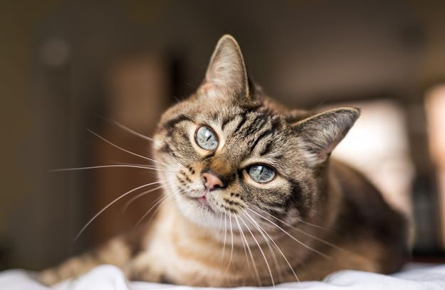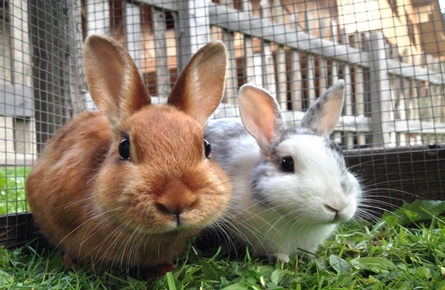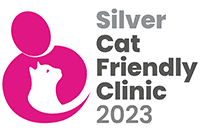Preventative pet vaccinations have been shown to reduce the occurrence of many life-threatening infectious diseases significantly. Unfortunately, these diseases are still prevalent and can be fatal to our pets.
Vaccinations do not last a lifetime, and an annual booster vaccine generally provides ongoing immunity. Dogs, cats and rabbits should all receive the benefit of solid protective immunity by being vaccinated from an early age, usually when their immunity passed on from their mother starts to weaken.
Book a vaccination appointment
How do pet vaccines work?
Vaccines contain harmless (either weakened or dead) variants of the viruses and other infectious agents. When an animal is vaccinated the immune system in the body responds by generating a protective mechanism through the formation of antibodies. If the animal then becomes exposed to the actual disease at a later date, those antibodies will prevent the disease from developing.
The type of vaccines we recommend will be based on your pet’s lifestyle, risk factors and current guidance. Modern vaccines give protection to multiple diseases with just one or two injections. It is important to remember though that vaccines don’t give lifelong immunity and that is why regular booster vaccinations are recommended. It is also an excellent opportunity for your pet to have a full health check. We send out reminders for all pet vaccinations; please contact us to book an appointment.
Dog vaccinations
Distemper, Hepatitis, Leptospirosis, and Parvovirus are all puppy vaccinations which can start from 6-8 weeks of age.
At Leadon Vale Veterinary Centre, we usually give the second pet vaccinations of both distemper, hepatitis and parvovirus vaccination with the second leptospirosis vaccination at 12 weeks. However, you may wish to opt to give the second Distemper, Hepatitis and Parvovirus vaccination at 10 weeks old to permit your puppy to socialise sooner. The final Leptospirosis vaccination is then given 4 weeks after the initial vaccination. The sooner your puppy is vaccinated, the sooner he/she will be able to begin socialisation with other dogs. Adult dogs are advised to have an annual booster.
The team here at Leadon Vale Veterinary Centre can provide the following vaccinations for your dog:
- Parvovirus
- Leptospirosis
- Distemper
- Canine Infectious Hepatitis
- Rabies
- Leishmaniasis
- Herpes vaccination
- Kennel Cough
A full health check is booked for every dog that is having a vaccination to ensure that they are in good health before giving the injection.
Book a vaccination appointment for your dog
Kennel Cough
If your dog needs to go into kennels or daycare, they will need a Kennel Cough vaccination. Please ensure you seek advice to ensure they are covered before booking them in; most kennels request animals be vaccinated at least two weeks before boarding.
The kennel cough vaccination protects against Bordetella and Parainfluenza and lasts for a year so that it may be given at the same time as your annual vaccinations. The vaccine can be given from 3 weeks of age.
This is a live vaccine which is given by placing a small amount of fluid into your dog’s nostril or mouth. It will reduce the chance of your dog contracting kennel cough and the severity of the disease, but it cannot provide full immunity due to the variety of strains involved. This vaccine will reduce the chance of your dog contracting kennel cough and reduce the severity if they do, but it cannot provide 100% protection due to the variety of strains involved. Due to the vaccine being live, dogs can exhibit mild symptoms of the disease temporarily after the vaccine. If you are immunocompromised, then please inform the Vet as the vaccines will need to be performed without you present.
Rabies
Please contact us to discuss rabies vaccinations if you're planning on taking your pet abroad. Plenty of time before travelling will be needed depending on where you are travelling to. Please see the current guidelines on the government website.
Cat vaccinations
The primary vaccination course for kittens consists of two injections. As with puppies, kittens will have some protection from their mothers in their bloodstream, which is why a second injection of the vaccine is required to complete immunisation.
Kitten vaccinations start from nine weeks of age for Cat Flu, Enteritis and Feline Leukaemia. A second vaccination is required three to four weeks later. We then suggest an annual vaccination.
Here at Leadon Vale Veterinary Centre, we can vaccinate your cat against the following diseases:
- Cat Flu
- Feline Enteritis
- Feline Leukaemia Virus
- Feline Chlamydophila
We can talk you through any type of pet vaccinations that may be required for your cat.
Book a vaccination appointment for your cat
Rabbit vaccinations
Rabbits are vaccinated against two deadly infectious diseases, Myxomatosis which is spread by blood-sucking insects such as rabbit fleas, and Viral Haemorrhagic Disease (VHD) which is spread between rabbits, or in contaminated hutches and bedding and toys. There is now a new strain of VHD, called VHD-2, which is also potentially fatal. We administer a combined annual vaccination for Myxomatosis and VHD 1 and 2.
Antibody Titre testing
The veterinary industry is in agreement that vaccines are necessary, but there is some debate regarding the frequency at which they are administered. At Leadon Vale, we offer our canine patients the option to have antibody titre testing. This allows us to see if an animal is protected against Distemper, Hepatitis and Parvovirus. There is currently no method of checking antibody titres for leptospirosis, so we still recommend this be given yearly.
Antibody titre testing is performed by taking a blood sample from your dog and being sent to an external laboratory for a VacciCheck test. This is a rapid and affordable option to check the titre levels for the core diseases that are vaccinated against. It provides easy-to-interpret results which determine whether the animal has a protective level of the immune response or whether they need revaccination.
With high sensitivity and specificity, VacciCheck is designed to ensure that animals are protected whilst avoiding unnecessary medical intervention. This is supported by the World Small Animal Veterinary Association (WSAVA) Guidelines, which state that an animal that returns a positive titre has a protective level of immunity and therefore does not require revaccination.
Book a vaccination appointment for your rabbit
Pet Vaccinations FAQ section
Vaccinations FAQs
Why does my pet need to have vaccinations every 12 months?
Depending on the disease that your pet is being vaccinated against, the period of time that they are protected will differ. Certain diseases, such as leptospirosis in dogs and flu in cats only carry around 12 months of protection, which is why a yearly booster is recommended. Even though your pet might be being vaccinated every 12 months, it is not always against the same diseases – your vaccination card will show you which diseases they are getting boosters for each visit. Visiting us every 12 months for vaccinations also means your pet gets a full annual health check, which is equally important!
Does my pet need to be vaccinated if they live inside?
Although your pet may not go outside, it is still possible for diseases to be brought into the house. This could be via soil on a dirty boot or via other wildlife that could enter the home. Therefore, having full vaccination can provide the protection needed for all circumstances, meaning you don’t have to take the risk.
I have heard that vaccines are risky and to avoid them – is that true?
Any veterinary procedure that is performed can carry some risk; however, in the case of vaccinations, it is important to remember that for the majority of pets the benefits of being vaccinated greatly outweigh the risks. Vaccination reactions are rare, and where they do occur, they are mostly short-term and mild. Reactions of this nature show that the vaccine is effectively stimulating the immune system.
The team at Leadon Vale are always happy to talk to you about the benefits and risks associated with vaccinating your pet to help identify the most suitable strategy as part of their wider preventative healthcare programme.
Are there any schemes/offers to help with covering the cost of my pets’ vaccinations?
Our Pet Health For Life Plan offers the best value way to vaccinate your pet to ensure they have the preventative health protection they need over the course of their lifetime. Being a member allows you the opportunity to spread the cost over 12 months whilst also receiving discounts on other services at Leadon Vale Veterinary Centre.
For more information on how we can help you stay on top of your pet vaccinations programme, please contact us.







